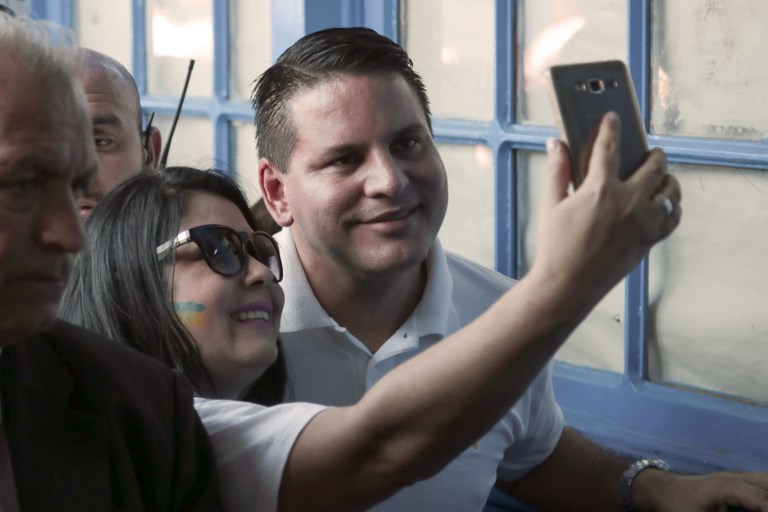
by Marco Sibaja
Agence France-Presse
SAN JOSE, Costa Rica (AFP) — A conservative, evangelical lawmaker who fiercely opposes gay marriage emerged as the frontrunner to become Costa Rica’s next president, according to partial results from a first round election Sunday.
Fabricio Alvarado of the right-wing National Restoration Party received 26 percent of the vote, according to a count of over half the ballots, according to the country’s Supreme Electoral Tribunal.
That placed him in the lead of a field of 13, the top two of which will go to a runoff election on April 1.
Alvarado’s nearest rivals were Antonio Alvarez Desanti of the centrist National Liberation Party, with 20 percent, and Carlos Alvarado (no relation), a former labor minister who is the candidate of the left-leaning Citizens’ Action Party (PAC), with 19 percent.
Definitive final results from the first-round election were to be given on Monday.
Outgoing President Luis Guillermo Solis, a former academic and PAC man, is constitutionally barred from re-election.
Electoral authorities said Sunday’s polling was calm, with turnout at 65 percent. Voting was also to select a new legislative assembly.
Key issue
Same-sex marriage emerged as a potent vote swinger in the 3.3-million strong national electorate.
Fabricio Alvarado, a journalist and a lawmaker in the outgoing legislature, rocketed from obscurity to the lead by homing in on the issue, strongly voicing opposition.
His stance resonated with voters in the socially conservative country, which joins the rest of Central America in standing apart from moves in much of South America to recognize gay marriage.
Argentina, Brazil, Colombia and Uruguay all accept such unions, and other neighbors appear poised to follow suit.
Additionally, the Inter-American Court of Human Rights — which is hosted in Costa Rica’s capital — last month urged Latin American nations to accept homosexual marriage.
Costa Rica’s outgoing government has indicated its willingness to follow the court’s exhortation but has butted up against refusal from the notaries’ association that conducts marriages, and church groups.
While past surveys suggest as many as two-thirds of the country’s citizens harbor conservative views on that and other issues, around a third are just committed to progressive changes.
One of them was Nelia Araya, a 20-year-old student who said as she voted in San Jose that she was worried about the “homophobic discourse” put forward by Fabricio Alvarado.
In a related gesture, eight women went to vote in different polling stations dressed in costumes modelled on “The Handmaid’s Tale,” a US TV series about a dystopian future in which women are subjugated, to protest what they termed a “fundamentalist threat.”
Climbing deficit
Solis, the outgoing president, had said as he voted that he saw the biggest problem facing Costa Rica to be “the fiscal deficit and its combination with the debt.”
Accompanied by relatives and advisers, the outgoing leader called on voters, who were also choosing a new legislative assembly, to “elect a government better than mine, a president better than me.”
A country with a costly health and pension system, Costa Rica has seen its deficit inch up to stand the t 6.2 percent of gross domestic product.
Public debt is 65 percent of GDP, creating concerns among officials that much-vaunted economic stability could be threatened.
The outgoing government — like the three before it — was unable to push through tax reforms to counter the growing deficit.
© Agence France-Presse







